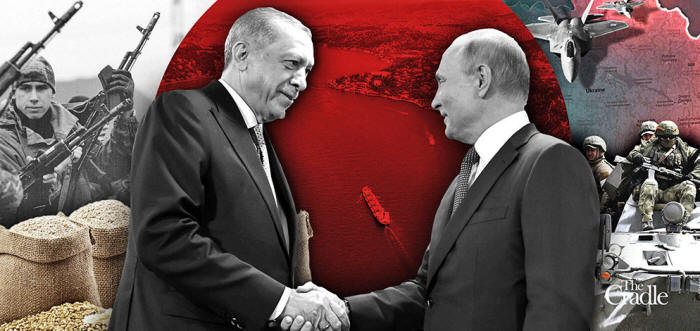|
by MK Bhadrakumar from TheCradle Website
The Cradle
The Ankara-Moscow relationship challenges western expectations:
What makes a power relationship intriguing in international relations is that it is never quite static, and its delicate equilibrium demands constant nurturing, balancing acts, and fine-tuning.
The 10-month hiatus in a face-to-face interaction between Russian
President
Vladimir Putin and Turkish
President Recep Tayyip Erdogan at their Sochi meeting on 4
September was unnatural, given the torrent of vital geopolitical
events that have transpired in the interim.
In the full flush of his election victory, Erdogan made certain efforts to mend fences with the west, signaling a willingness to agree to Sweden's induction into NATO and showing solidarity with Ukraine.
In moves that could seriously upset Moscow, Ankara wantonly released Azov commanders who were captured by Russia in Mariupol last year and announced an intent to jointly produce weaponry with Ukraine.
Nonetheless, Moscow reacted cautiously...
The Kremlin could afford to mark time since this is also an asymmetrical relationship where Russia holds the upper hand.
Moscow could sense that Erdogan was not really "pivoting" to the west, but was rather showing an interest in improving western ties which had soured in recent years - and its outcome remains far from certain.
Basically, Russia's relations with Turkey are fortified by the warm personal equations between Putin and Erdogan, and both leaders are consummate realists with shared interests and a keenness to challenge Western dominance in regional politics.
Moscow is only too well aware that Turkey's hopes for membership in the European Union remain a far-fetched dream...
The "body language" of the meeting in Sochi confirmed that there is no change in the verve of the personal relationship between the two leaders.
Television footage showed the two men smiling and shaking hands upon Erdogan's arrival at Putin's residence, where the Russian president suggested that his guest take a vacation in the Black Sea resort.
Game-changing grain export deal
In his opening remarks, Putin put Erdogan at ease by reassuring him upfront that the Russian offer to create a global "energy hub" in Turkey is very much in the cards and will materialize soon.
However, the icing on the cake is the proposed agreement that would facilitate free exports of grain from Russia to six African nations with the help of Turkey and Qatar.
In Erdogan's presence, Putin announced:
The political and geopolitical resonance of this decision in Africa is simply immeasurable:
In one fell swoop, western propaganda was trashed, with some help from Ankara.
Erdogan, on his part, expressed confidence that Russia would "soon" revive the Black Sea grain deal, while also echoing Putin's stance that the west had betrayed its deal commitments with Russia.
Equally, he distanced Ankara from rival western plans to send grain across the Black Sea - which now becomes a non-starter.
As he put it:
Significantly, Erdogan voiced optimism that he still believes a solution can be found soon to revive the grain deal, including filling the remaining gaps.
The Turkish president was accompanied in Sochi by a large delegation that included Turkey's defense, foreign, energy, and finance ministers, as well as the central bank chief who met his counterpart separately to carry forward negotiations on a payment system in local currencies.
Which Erdogan publicly supported when he said:
Russia's respect for Turkey's sovereignty
Indeed, trade is the locomotive of the Russian-Turkish relationship, registering a massive increase of around 80 percent to touch $62 billion.
Five million Russian tourists visited Turkey this year. Putin voiced satisfaction that he and Erdogan have raised the relations to a "very good, high level."
Interestingly,
These are measured words, no doubt.
The summit followed last week's talks between Turkish Foreign Minister Hakan Fidan and his Russian counterpart Sergei Lavrov and Defense Minister Sergei Shoigu in Moscow.
Later, in the presence of Fidan, Lavrov spoke at some length and with extraordinary clarity about Russia's policies towards Turkey.
The salience lies in Russia's profound appreciation of Turkey's independent foreign policy,
Lavrov said Turkey's,
Lavrov expressed the hope that Turkey,
He concluded:
An Equal and Evolving Partnership
Evidently, Lavrov spoke with great deliberation and purpose.
What emerges is that although NATO-member Turkey has not yet sought membership in the expanded BRICS or the Shanghai Cooperation Organization (SCO),
...Russia nonetheless gives pivotal importance to Turkey given its strategic autonomy, which is both a game changer in regional politics and a trendsetter.
His remarks show the futility of assessing power relationships in terms of hierarchy.
Does that qualify as a strategic partnership? The jury is still out...
Russian-Turkish relations are anchored on mutual interest and mutual respect, where differences do crop up every now and then, but both take care to prevent them from snowballing into disputes.
It was Putin's turn to travel to Turkey, but instead Erdogan came calling. There is no junior or senior partner in their equal relationship.
The relationship with Turkey has evolved into an interesting vector of Russian foreign policies, which is, of course, consistent with its vision of multipolarity.
It can also provide a new model for Russia's relations with other west-leaning regional powers, given the prevailing geopolitical uncertainties.
As Lavrov stated recently,
|


